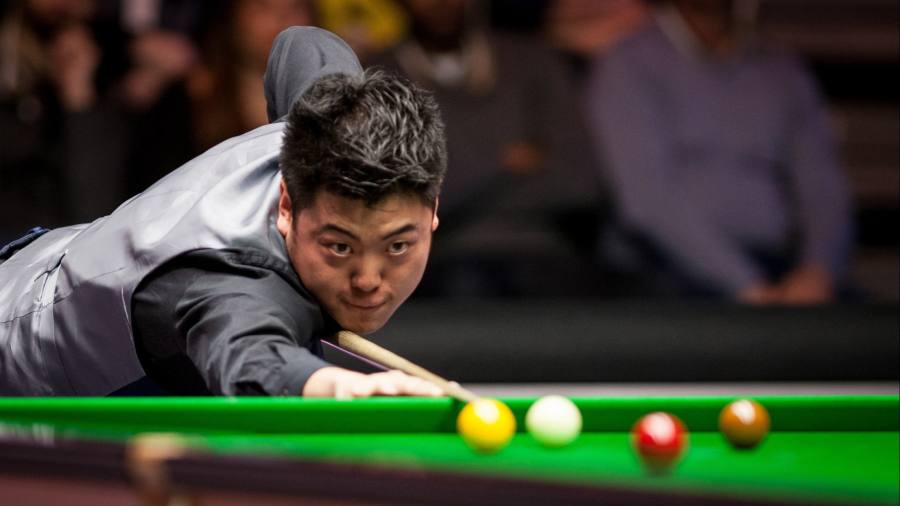At Star Billiards, a brightly lit cue sports venue in the Workers Cultural Palace of Shanghai’s Changning District, a scandal unfolding several thousand miles away feels uncomfortably close to home.
The sport’s top authority this week banned 10 UK-based Chinese players including leading talents Liang Wenbo and Yan Bingtao for their involvement in a match-fixing scandal. “Many of us here are fans of these players,” said Ding, who runs Billiards and only gave his surname. “We are repulsed by this incident. We all feel this is a great pity.”
With thousands of snooker halls across the country, China now accounts for not only an estimated 50mn recreational players but also a quarter of the world’s top 100 players, compared with none a few decades ago.
The scandal raises questions for the industry and could threaten its popularity in China, which is responsible for 30 per cent of snooker’s global revenues across events and broadcasting.
The “video views [in China] are in the billions, not the millions”, said Jason Ferguson, chair of the World Professional Billiards and Snooker Association, the official governing body, and a former player.
Fewer active Chinese players could have commercial implications, said Mark Thomas, an analyst at S2M Consulting, a Chinese sports consultancy. “That means there’ll be less Chinese involvement, which will probably mean less media interest, which means if there’s less media interest, there’s less sponsorship, there’s less advertising revenue,” he said.
“You don’t stay up all night to watch a competition in order to watch ‘gambling dogs’,” complained one user on Xiaohongshu, a popular social media platform in China.
Snooker gained momentum in China in the early 2000s, propelled by charismatic stars such as Ding Junhui who contested a memorable Masters final in 2007 against Ronnie O’Sullivan.
Thomas pointed to Ding as an example of “a sports hero” that Chinese people could get behind. “I think that’s always really important when you’re trying to sort of develop sports in other countries,” he said. The 2016 World Championship, in which he reached the final, attracted 300mn viewers globally, more than two-thirds of them in China.
The latest scandal emerged after suspicious betting activity last year prompted authorities to investigate. The WPBSA, which oversaw a detailed report, noted that the Chinese players, a “close-knit group” were based in Sheffield to participate in international competitions and had been unable to return home during the pandemic.
Some players did not earn money unless they won matches, a system that is now under review. The players were isolated, under financial pressure from travel expenses, living costs and their own “ill-judged gambling and betting habits”, the report said.
The Chinese Billiards and Snooker Association had already banned six players from domestic competitions in December for the incident, adding that it “firmly opposes match fixing, gambling and other acts that violate sports integrity and ethics”. It vowed to mete out further punishment following the WPBSA investigation.
The scandal highlighted the sport’s exposure to international gambling networks that have distorted competitions from tennis to basketball. Although the players in question received match-fixing fees of several thousand pounds, they facilitated larger and ultimately unknowable flows of money behind the scenes. “This is not a snooker problem, neither is it a Chinese problem — it is a global issue in all sports,” said Ferguson.
The incident also raises questions over the provenance of gambling activity, which is banned on the Chinese mainland. “Asia is the heartland of match fixing globally,” said Diogo Guia, director for sports public policy at the International Centre for Sport Security.
“It’s not going to go away, it’s a fight that is ongoing, there will always be people,” said Ferguson. “Probably no amount of education whatsoever would have stopped these players falling into that trap.”
At a recent amateur tournament at Star Billiards, players vied for a prize pot of Rmb14,700 ($2,060) in the kind of grassroots event that could for many participants be the first step on a ladder to international glory.
“I hope this will pass as soon as possible,” said Ding, the Star Billiards boss. “From Ding Junhui to so many players nowadays, reaching that level of development is not easy.”
Read the full article here




